- Home
- Anne McCaffrey
Acorna’s Quest Page 5
Acorna’s Quest Read online
Page 5
Markel had just reached that point in his reasoning when Illart announced that it was time for their sleep shift. Under the circumstances, the only thing he could possibly do was wait until his father started snoring and then sneak a portable console into his sleep tube to try out the new model for himself. Despite Johnny Greene’s certainty that the built-in checks in the system would prevent his inadvertently crashing the ship’s computers, he decided that it would not be prudent to test the new model directly. Besides, it would take half the shift to download the amount of weather data he’d need. Instead, he wrote a quick and dirty driver program that would simulate the running and systems requirements of both Dr. Hoa’s models, given unlimited data.
The results were almost identical. The new version could handle more nonlinear equations than the old one before it crashed, but it still didn’t get anywhere near the predictions stage of the program. Markel switched off the portable console and lay with his arms behind his head, thinking. If Dr. Hoa’s work was this far from completion, why had he found it necessary to flee Khang Kieaan?
Next shift, the Haven was settling into orbit around Rushima, and Illart was too busy preparing to negotiate for the Council with Rushima to answer Markel’s questions. Markel wound up, as usual, perched on Johnny Greene’s cluttered worktable in the CaN, or Computation and Navigation.
“Hoa hasn’t actually been working much on the prediction model since that paper you first saw,” Johnny said, supporting Markel’s deductions of the shift before. “He’s a meteorologist by trade, not a mathematician, and he says what that model needs is some new mathematical insights—and he sure hasn’t got them.”
“Then why did he really want to leave Khang Kieaan? The original work has been out for over a year. Isn’t it a little late for him to worry about somebody misusing his research? Besides,” Markel added, as snidely as befitted somebody who’d been up for most of his sleep shift comparing a cleverly disguised “new model” with its virtually identical predecessor, “you can’t even use this one, let alone misuse it.”
“Oh, don’t underrate Hoa’s work,” Johnny said, “it’s the best weather-prediction model going, and even if it’s not long-range or perfect, it ought to be a considerable improvement on whatever the Rushimese are currently using.”
“I still don’t get why he had to be smuggled out in a sack of kava beans.”
Johnny sighed and touched his console with one finger to halt the program he was running. “And you’re not going to stop asking why until you get some answers, are you? Pestilential brat,” he added, but his voice was warm. “What you need is a walk in the Garden. Get some exercise. You’ve been staring at your data console all night again, haven’t you? You’ll addle your brains that way.”
“I’m not—” Markel began. Johnny hushed him with a hand signal that dated back to the time of his first arrival on the Haven, when he’d spent hours playing Miners and Martians with a lonely kid whose father was wrapped up in Council business and in grieving for a mother Markel could barely remember. That waggle of the fingers, Markel remembered, meant, “Hush, we are observed.” And the slight crook in the thumb meant “Follow me silently.”
The “Garden” was actually the part of the Haven’s hydroponics unit that was open to general view: a network of narrow trails on the spongy damp flooring of the unit, past flowers and fruits and greens that had been carefully trained to drape over the edges of their ugly tubs. Markel had never seen the point of it, but the Starfarers of his father’s generation, who had actually wanted—wanted! he thought in amazement—to become dirt farmers, who remembered living dirtside in the inefficient alternation of light and darkness that didn’t fit human biorhythms, insisted they needed this gardenlike section to remind them of their past lives.
Today, though, there were no visitors other than Johnny and him. Probably everybody was too busy preparing for the Rushima negotiations, or too anxious to hear the results, to take time for smelling the flowers.
“You’re not cleared for this information,” Johnny began abruptly once he had ascertained that there were no other visitors to the Garden. “I’m only telling you because I know how hard it is to stop you when you’ve got your teeth in a problem, so I know you’ll be worse trouble and probably uncover more stuff if I don’t give you a little now. But I’d hate to have to explain to the Council that I couldn’t head off a sixteen-year-old’s ‘’satiable curiosity,’ so just keep it to yourself, will you, Elephant’s Child?”
The nickname came from an old story Johnny had once told Markel, about a baby elephant who got into terrible trouble and had its nose pulled until it became a trunk, all because it refused to stop asking annoying questions.
“You haven’t actually told me anything yet,” Markel pointed out, “except that there’s something to tell. Now that I know that, of course I’m going to be curious.” He grinned at Johnny.
“All right. I told you Hoa hasn’t been working on the weather-prediction model for over a year, and that’s true. This paper we’ve been given to read is just a rehash and slight improvement of his earlier stuff, put out to convince the heads of his research lab on Khang Kieaan that his more recent work has not been productive and that he is going back to the prediction model. The fact is that his experiments have been quite successful. Terribly successful,” Johnny added in somber tones. “He didn’t want them to fall into the hands of any of the three Khang Kieaan parties for fear that whichever party had it would use his work to destroy the other governments, and probably destroy the planet in the process. And there were too many people involved in the work to keep it secret indefinitely; even though he was the only one who knew all the parts of the project and could put it together, he was afraid some lab assistant or graduate student would let out enough to get the head of the lab interested. He had already converted his notes to a single datacube and erased all his working files, and he was prepared to blow up the datacube and himself if they came for him before he found a way off-planet. You can imagine that he was very glad to learn of the Haven’s visit.”
“Okay, okay.” Markel was practically dancing with impatience. “But what is this ‘terribly successful’ work, and when do I get to see it?”
“You’re not having these papers,” Johnny told him. “Nobody but Council heads and a few selected experts have been invited to study them.”
“Like who?”
“Well…yours truly, for one, which is how come I know enough to know that you shouldn’t be asking questions right now. Sengrat, because if we can find a useful application for the work, he’ll be in charge of building the equipment needed. I don’t know who else. Not many.”
Markel could tell when he was beaten. “You could at least tell me what it’s about.”
“I could at least get my head ripped off by your father for breaching security to the extent I already have,” Johnny muttered. “Look, kid. If I tell you the general area Hoa’s been working on, do I have your word of honor that you’ll stop asking questions, and you won’t hack into the ship’s system to get any more information on it, until it’s released for public consumption? He’s taking a big step here. He doesn’t trust his own people to use this work wisely, but he does trust the Starfarers. Do you have any idea what that says about the reputation men like your father have built up in a decade of fighting for justice? And do you see what a betrayal of Hoa’s trust it would be if we let word of the results spread as soon as we knew what he’d been working on?”
Dry-mouthed, Markel nodded. “Okay,” he said. “You have my word I won’t ask any more.” The next thing cost him an effort to say, but he managed it anyway. “You don’t even have to tell me what it’s about, if you don’t want to. Besides,” he couldn’t resist adding, “I bet I can guess.”
“Anything but that,” Johnny exclaimed in mock horror. “Better you should know than we should be subjected to the guesses you’ll dream up…. He’s moved from studying weather prediction to studying weather manipulation. Ev
erybody knows that if you zap a planet’s ionosphere with enough energy you can disrupt communications and cause unusual weather patterns; well, Hoa’s been refining on that, getting more accuracy, working with a series of targeted laser beams and precise timing sequences. From what I’ve seen of the preliminary results, it wouldn’t be an exaggeration to say that he can call down lightning out of the heavens.”
True to his word, Markel did no more investigating of Dr. Hoa’s recent research. Instead, he put in a casual quarter of an hour answering the questions the electronic math tutor had allocated for that week, then decided to revert to last year’s childish pursuits and play a few rounds of SimArmageddon. But the console beeped a warning at him instead of bringing up the sim game, and neon green capital letters flashed a message on the screen.
YOUR ACCESS TO GAMES HAS BEEN RESTRICTED UNTIL YOU WRITE THAT TERM PAPER FOR THE LANGUAGE AND COMPOSITION TUTOR. LOVE, ILLART.
Markel hated actually composing papers—language was so clumsy compared to the pure, sparse beauty and rigorous meanings of mathematics and computer languages. He felt sure that he could easily enough hack his way around whatever restrictions Illart had imposed. No First-Gen Starfarer could know his way around the Haven’s computers the way the children of the Starfarers did. But Illart would probably consider that dishonorable.
With a sigh Markel settled down to think over the assignment. Research and write the biography of an adult with whom you are personally acquainted. Verify all statements with documentation and interviews. Where there is a conflict between documentation and the personal account, resolve the conflict without either falsifying the documented facts or offending the interviewee. Oh, great. Not only was he going to have to write complete sentences and paragraphs and do footnotes, he was going to have to practice Tact and Diplomacy 101.
Well, let’s see. Doing Ximena would give him an excuse to “interview” her…but he felt sure the tutor would not count a Starfarer of his generation as an “adult,” even if she was four years older than him and inclined to identify herself with the older generation. Johnny Greene wouldn’t take offense at anything Markel wrote, but he was a slippery customer; Markel had already discovered that Johnny was vague about certain episodes in his past and that a lot of his life had somehow slipped through the bureaucratic meshes of the galactic Lattice.
Everybody else would be doing some First-Gen Starfarers; Markel cringed at the thought of hearing all those histories of the Theft of Esperantza from various points of view. He would have to do something different…there was that woman Sengrat had mentioned, Nueva Fallona of Palomella. She must be quite old, at least thirty, but Markel wouldn’t mind interviewing her one bit. He thought about glimpses of a curtain of straight, iridescent, reddish bronze hair, a firm chin, eyes that always seemed to be looking into some distance only she could see. And she was intriguing, with that slight limp and the elegant cane she used, made of a reddish bronze to match her hair, turning her disability into an affectation. Probably she’d been tortured by the Palomellese government and was too proud to talk about her past sufferings. Yes, she’d definitely be an interesting subject. Besides, Markel would bet nobody else in his age class would think of doing a Palomellese; it wouldn’t have occurred to them that they could access Palomella’s data bases via the Lattice. True, there’d be just a little hacking involved…but it was research for an assigned paper, Markel told himself virtuously.
And the Haven’s computer-tutor seemed to agree, or else Illart hadn’t thought of restricting Markel’s access to anything other than games, for it let him access a gateway to the Lattice with no trouble at all. He didn’t really have to start working until he reached Palomella’s first level of security. When Illart returned upset from a two-shift-long Council meeting, Markel’s mood was somber enough to match his.
“How did it go?” Markel asked from the tube, where he’d been lounging and watching old music vids. “You missed our mess time. Want me to go to the kitchens and get a bowl of hotchpotch for you?”
“No, thanks,” Illart said. “They sent in food between shifts, so we wouldn’t have to break for mess.”
“How come?” Markel thought he knew the answer, but he wanted the satisfaction of hearing it from his father. “You always said it was a good idea to break up long meetings, give everybody a chance to simmer down.”
Illart rubbed the back of his neck with one hand, and Markel knew from the gesture that his father was suffering one of the agonizing tension headaches that had plagued him ever since he took over from Andrezhuria as First Speaker. Perhaps it was time he handed over to Gerezan. Markel slipped out of his tube and squatted behind Illart to rub the tense cords of muscle in his neck.
Illart sighed with relief. “That’s better. You’ve your mother’s touch. When I came in hot and sweaty and aching from the fields, Aiora used to rub the ache out of my muscles as lightly as a butterfly’s wing.”
Markel could almost remember the scene—or was it just that Illart had reminisced about it so many times? All that Markel could truly remember of their life on Esperantza was the communal crèche where Illart had left him for the long hours of daylight after his mother died. He couldn’t even remember what his father had been like in those days; he was usually asleep by the time Illart came in from the fields to collect him. He’d been looking forward to turning five, when he would be old enough to follow Illart into the fields and collect stones, or help with some other farming task, instead of staying in the crèche with the babies. Life on the Haven had been a joyous adventure of freedom and exploration compared to that, an unexpected boon from the heavens….
Markel abruptly switched his thoughts back to the present, as he always did when his reminiscences reached that point. It seemed disloyal to Illart and the others who had given more than ten years of their lives seeking justice, to admit that he for one didn’t really want to go back to Esperantza or any other dirtside life. Crowded and dilapidated the Haven might be, but it was far more home to Markel than any vague memories of dirtside life.
And he mustn’t let Illart guess that, ever. It would hurt him too much.
“So tell me about the meeting,” he said instead. “How come you didn’t break for mess, and didn’t ’cast any of the discussion?” Usually, although not always, the Council meetings were broadcast on a separate channel for any interested citizen to view through the data console.
“We were discussing…classified matters,” Illart said.
“Why would the negotiations with Rushima be classified?” Markel asked in his most innocent voice. “After all, everybody knows that’s what we’re here for.”
“They’re not going well,” Illart said.
“I’m not surprised. After I looked at Dr. Hoa’s weather-prediction model, I can see why they might not want to pay for it. It’s not that much of an improvement on current systems.”
“Yes, but they don’t know that yet,” Illart said. “They haven’t seen the code…they just said no thank you, they’ve had three years of bad harvests planetwide and they owe so many back taxes to the Shenjemi Federation that they can’t even imagine throwing away their credits on high-tech frills. The wording,” he added dryly, “is Rushimese, not ours.”
“So it took two full shifts for them to turn us down?”
“Oh, no. That happened about ten minutes after we opened negotiations. The rest of the meeting,” Illart said wearily, “concerned what we do next.”
“Try somewhere else?” Markel hazarded.
“That seems to me our only option. But Nueva Fallona had another idea. You see, Hoa brought with him the results of some other research he’s been doing recently…I can’t tell you exactly what, you’re not cleared, but it has to do with actually modifying weather patterns rather than just predicting them. Nueva and some of the other Council members thought we might be able to use that research to convince the Rushimese that they needed our services.” Illart sighed again. “If Hoa’s work were accurate enough for us to gua
rantee a season’s worth of good growing weather, and if we could afford to wait around during that growing season, it might not be such a bad idea. But he doesn’t have that kind of control yet, as Nueva ought to know; she’s seen the abstracts Johnny Greene put together for all the Council members. I pointed out that we couldn’t predict what would happen if we started discharging pulsed energy into Rushima’s ionosphere—we could cause terrible catastrophes on the surface—and do you know what that woman said?” Illart’s voice rose in indignation. “That it didn’t matter what happened; if we could make their weather interesting enough, they’d be very happy to pay for our services. As if we’d stoop to running a ‘protection’ racket—pay us or we’ll destroy your climate! None of the original Starfarers would stoop to such a thing. Naturally, Andrezhuria and I quashed that idea. But it took forever. Some of the Council actually couldn’t see that Nueva was proposing to threaten Rushima until I spelled it out for them in plain language, over and over. The funny thing is,” Illart said, yawning hugely, “Nueva herself didn’t seem to be that unhappy when I made it clear that we’d never consider such an unethical procedure. The other Palomellese on the Council were griping and muttering, but Nueva actually seemed pleased that I wouldn’t even consider her proposal.”
In view of what Markel had learned about Nueva during his afternoon of hacking into Palomella’s secure data bases, this surprised him even more than it did Illart; but his father fell asleep before he had a chance to tell him what the Palomellese aboard ship had been tactfully not mentioning.

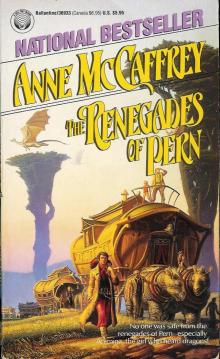 The Renegades of Pern (dragon riders of pern)
The Renegades of Pern (dragon riders of pern)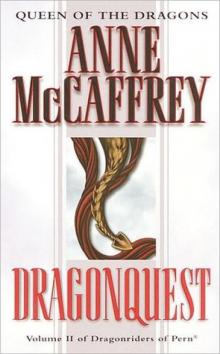 Dragonquest
Dragonquest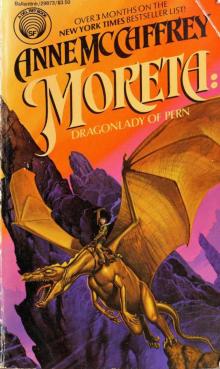 Moreta (Dragonlady of Pern)
Moreta (Dragonlady of Pern)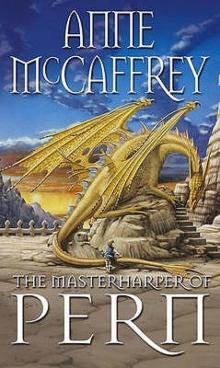 The Masterharper of Pern
The Masterharper of Pern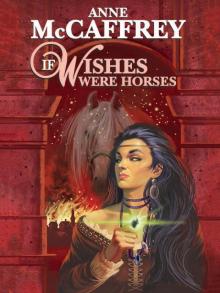 If Wishes Were Horses
If Wishes Were Horses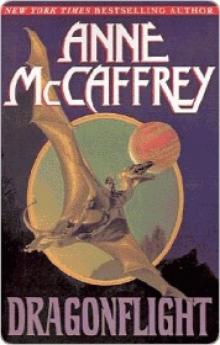 Dragonflight
Dragonflight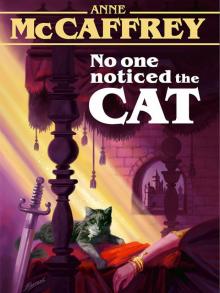 No One Noticed the Cat
No One Noticed the Cat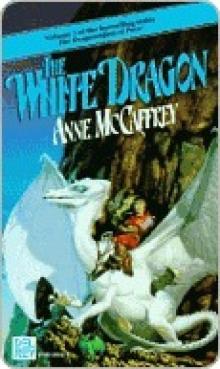 The White Dragon
The White Dragon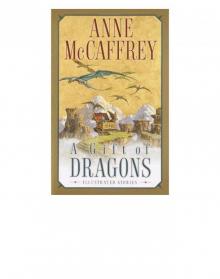 A Gift of Dragons
A Gift of Dragons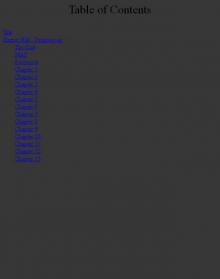 Harper Hall - Dragonsong
Harper Hall - Dragonsong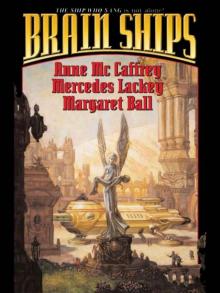 Brain Ships
Brain Ships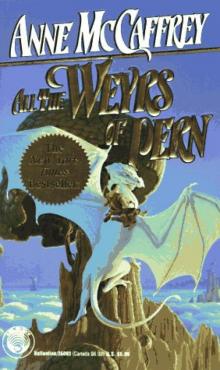 All The Weyrs of Pern
All The Weyrs of Pern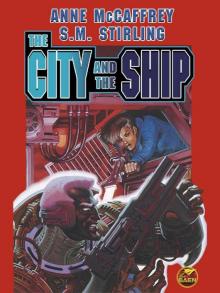 The City and the Ship
The City and the Ship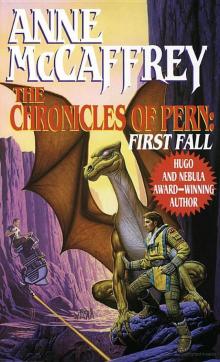 The Chronicles of Pern: First Fall
The Chronicles of Pern: First Fall Acorna’s Search
Acorna’s Search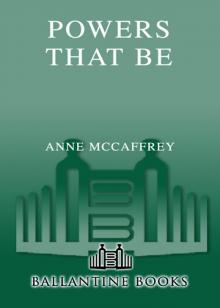 Powers That Be
Powers That Be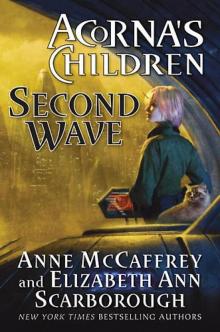 Second Wave
Second Wave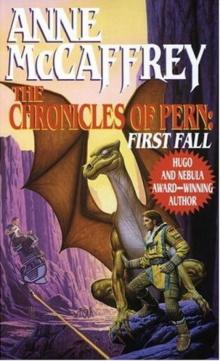 Chronicles of Pern (First Fall)
Chronicles of Pern (First Fall)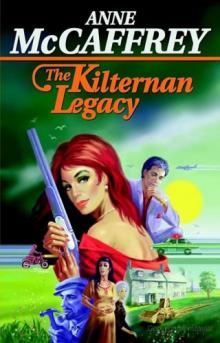 The Kilternan Legacy
The Kilternan Legacy Decision at Doona
Decision at Doona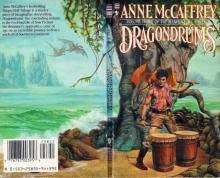 Dragondrums (dragon riders of pern)
Dragondrums (dragon riders of pern)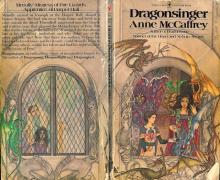 Dragonsinger (dragon riders of pern)
Dragonsinger (dragon riders of pern)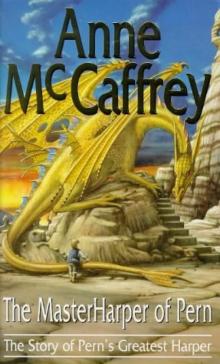 The Master Harper of Pern
The Master Harper of Pern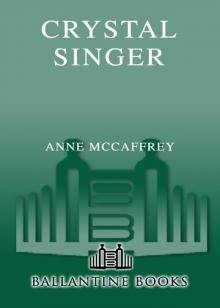 Crystal Singer
Crystal Singer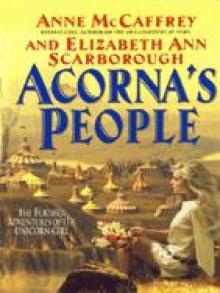 Acorna’s People
Acorna’s People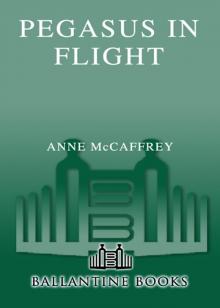 Pegasus in Flight
Pegasus in Flight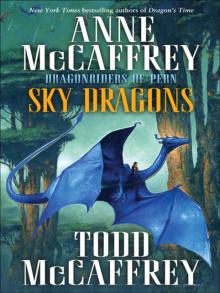 Sky Dragons Dragonriders of Pern
Sky Dragons Dragonriders of Pern Dragonriders of Pern 4 - Dragonsinger
Dragonriders of Pern 4 - Dragonsinger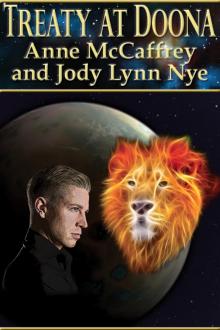 Treaty at Doona
Treaty at Doona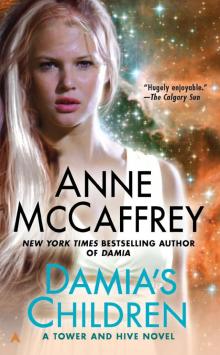 Damia's Children
Damia's Children Stitch In Snow
Stitch In Snow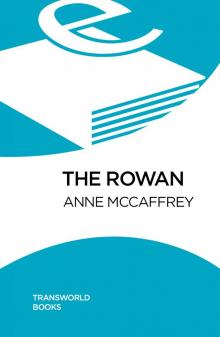 The Rowan
The Rowan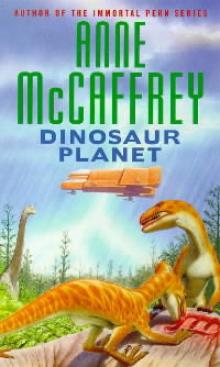 Dinosaur Planet
Dinosaur Planet The Year of the Lucy
The Year of the Lucy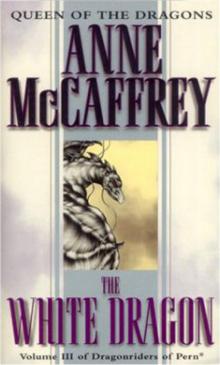 The White Dragon p-4
The White Dragon p-4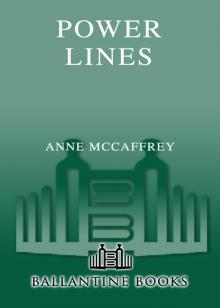 Power Lines
Power Lines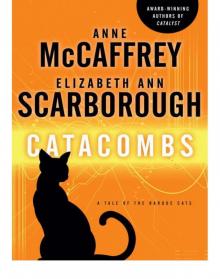 Catacombs
Catacombs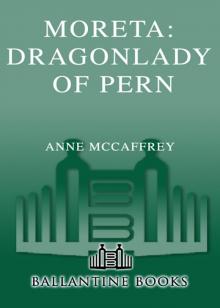 Moreta
Moreta Dragonsinger
Dragonsinger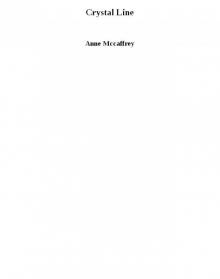 Crystal Line
Crystal Line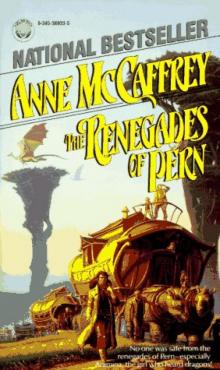 The Renegades of Pern
The Renegades of Pern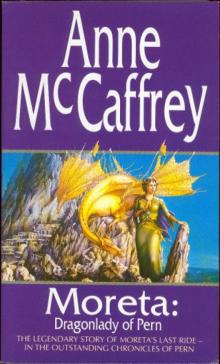 Moreta - Dragonlady of Pern p-8
Moreta - Dragonlady of Pern p-8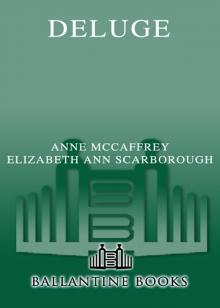 Deluge
Deluge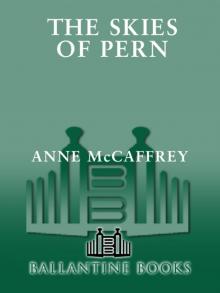 The Skies of Pern
The Skies of Pern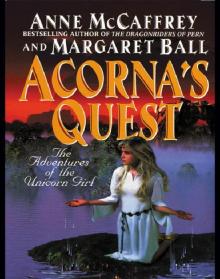 Acorna's Quest
Acorna's Quest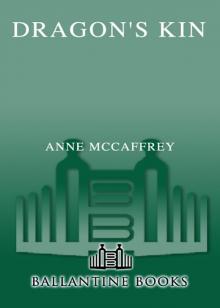 Dragon's Kin
Dragon's Kin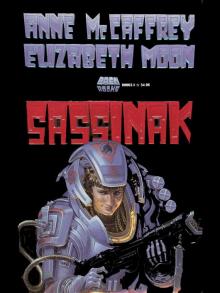 Sassinak
Sassinak![Crystal Universe - [Crystal Singer 03] - Crystal Line Read online](http://i1.bookreadfree.com/i1/03/31/crystal_universe_-_crystal_singer_03_-_crystal_line_preview.jpg) Crystal Universe - [Crystal Singer 03] - Crystal Line
Crystal Universe - [Crystal Singer 03] - Crystal Line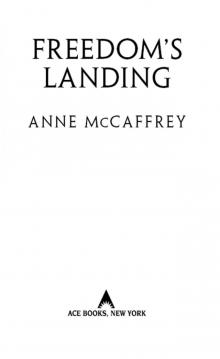 Freedom's Landing
Freedom's Landing Acorna’s Quest
Acorna’s Quest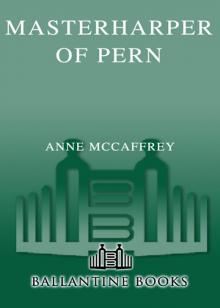 Masterharper of Pern
Masterharper of Pern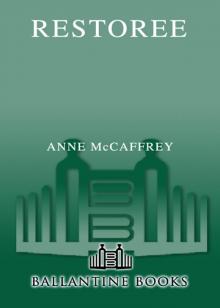 Restoree
Restoree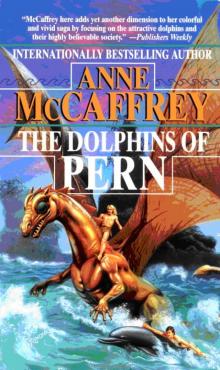 Dolphins of Pern
Dolphins of Pern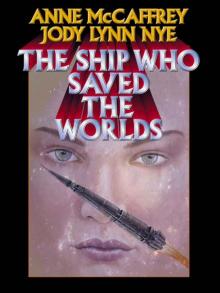 The Ship Who Saved the Worlds
The Ship Who Saved the Worlds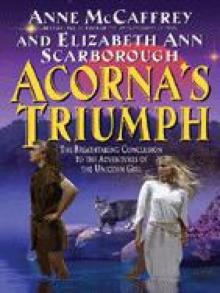 Acorna's Triumph
Acorna's Triumph Acorna's Rebels
Acorna's Rebels![[Acorna 08] - First Warning: Acorna's Children (with Elizabeth Ann Scarborough) Read online](http://i1.bookreadfree.com/i1/04/06/acorna_08_-_first_warning_acornas_children_with_elizabeth_ann_scarborough_preview.jpg) [Acorna 08] - First Warning: Acorna's Children (with Elizabeth Ann Scarborough)
[Acorna 08] - First Warning: Acorna's Children (with Elizabeth Ann Scarborough)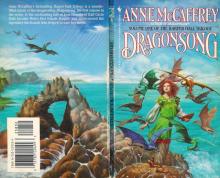 Dragonsong (dragon riders of pern)
Dragonsong (dragon riders of pern)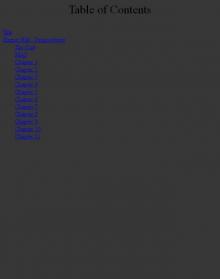 Dragonriders of Pern 6 - Dragondrums
Dragonriders of Pern 6 - Dragondrums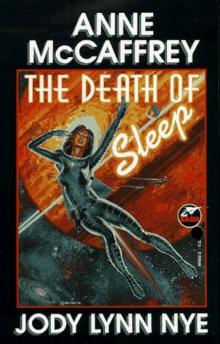 The Death of Sleep
The Death of Sleep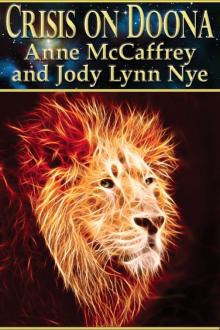 Crisis On Doona
Crisis On Doona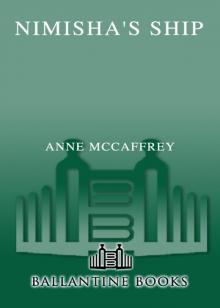 Nimisha's Ship
Nimisha's Ship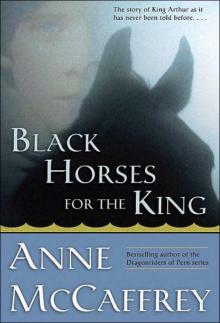 Black Horses for the King
Black Horses for the King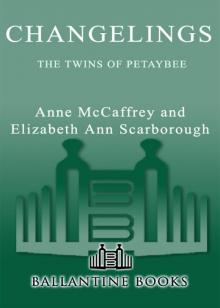 Changelings
Changelings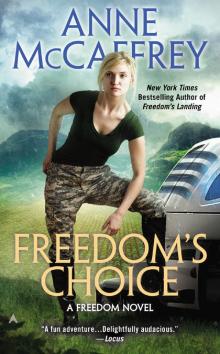 Freedom's Choice
Freedom's Choice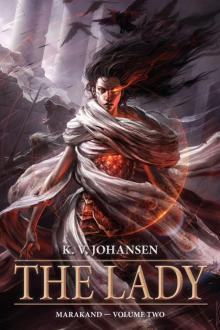 The Lady
The Lady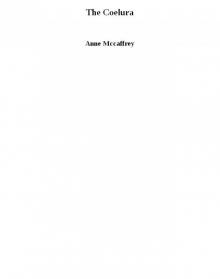 The Coelura
The Coelura Catalyst
Catalyst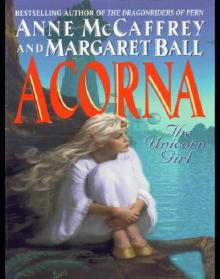 The Unicorn Girl
The Unicorn Girl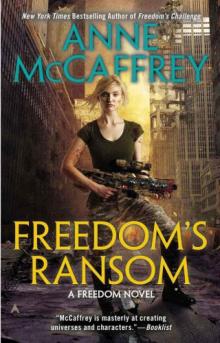 Freedom's Ransom
Freedom's Ransom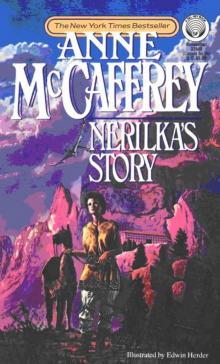 Nerilka's Story
Nerilka's Story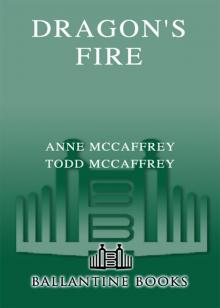 Dragon's Fire
Dragon's Fire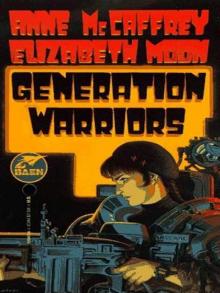 Generation Warriors
Generation Warriors Lyon's Pride
Lyon's Pride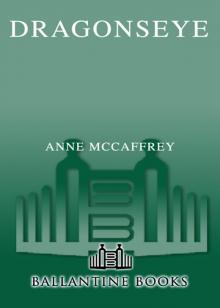 Dragonseye
Dragonseye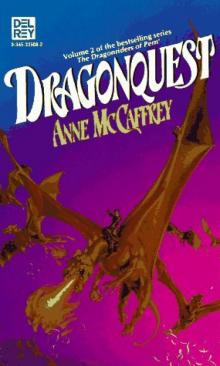 Dragon Quest
Dragon Quest Dragondrums
Dragondrums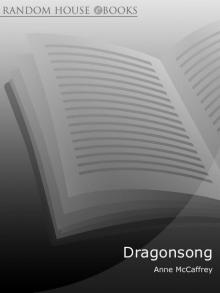 Dragonsong
Dragonsong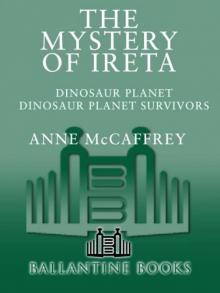 The Mystery of Ireta
The Mystery of Ireta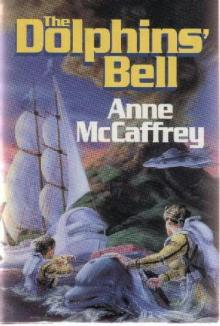 Dolphins' Bell
Dolphins' Bell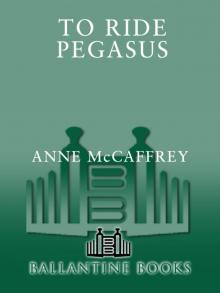 To Ride Pegasus
To Ride Pegasus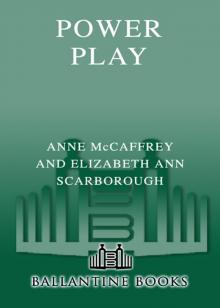 Power Play
Power Play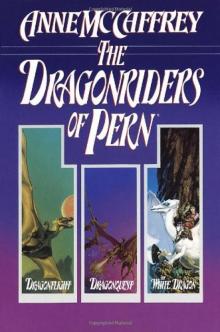 The Dragonriders of Pern
The Dragonriders of Pern An Exchange of Gifts
An Exchange of Gifts The Ship Who Sang
The Ship Who Sang Sky Dragons: Dragonriders of Pern
Sky Dragons: Dragonriders of Pern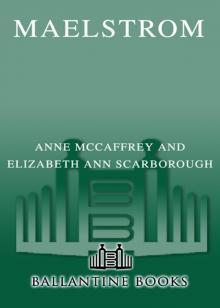 Maelstrom
Maelstrom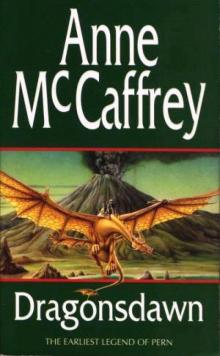 Dragons Dawn
Dragons Dawn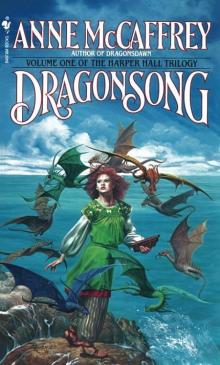 Dragon Song
Dragon Song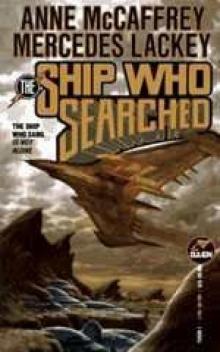 The Ship Who Searched b-3
The Ship Who Searched b-3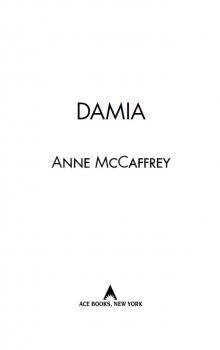 Damia
Damia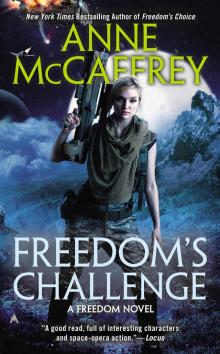 Freedom's Challenge
Freedom's Challenge